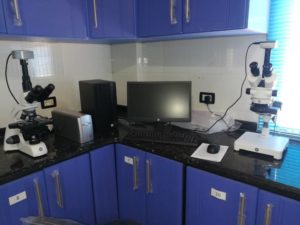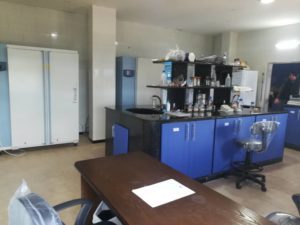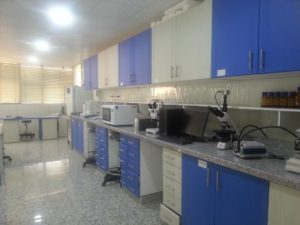Biotechniques and Laboratories Section
Research Laboratories are considered the scientific front of any research center, as no research authority can perform its mandated research tasks without specialized laboratories that test and evaluate the reached results of the experts, in addition to the fact that research laboratories serve as centers for exploration, experimentation and training and development of researchers’ expertise.
Tasks:
- Conduct all tests and analysis of the research projects implemented by the technical departments.
- Provide the necessary facilities for researchers to conduct laboratory experiments.
- Contribute to the preparation and implementation of ACSAD’s research plan.
- Transfer and localize modern laboratory techniques.
- Train and enhance the qualifications of the Arab staff in the field of modern laboratory techniques use.

This section includes the following laboratories:
Molecular biology laboratory:
This laboratory performs the following tasks:
- Study the genetic relativity of the animal and plant varieties and breeds; the fact that helps farmers in selecting the appropriate lines in the breeding programs.
- Detect the responsible genes of the plant and animal varieties and breeds.
- Develop genetic maps for plant and animal varieties and breeds, and load them into databases.

- Register the adopted lines and breeds in the world genetic database.
- Contribute to raising Arab qualifications level in the field of molecular biology by conducting training courses on the recent techniques in this field.
Soil, plant and water analysis laboratory:

This laboratory performs the following tasks:
- Conduct all physical and chemical analysis of soil, plant, water and fertilizer samples.
- Evaluate soil fertility and identify fertilization requirement.
- Evaluate irrigation water quality.
- Carry out laboratory experiments of salinity and water uses.
- Conduct training courses for the new technicians of the Arab countries to enable them to perform soil, plant and water analysis according to the international standards.
Organic analysis laboratory:
This laboratory performs the following tasks:

- Carry out all tests of fodder value identification.
- Carry out all tests of plant physiology.
- Conduct technical training for the new technicians of the Arab countries to enable them to perform all the analysis of fodders and plant physiology.
Plant tissue culture laboratory
This developed laboratory, which was established according to the recent international standards, is concerned with using modern scientific techniques in wheat crop breeding, and accelerating the process of high-quality varieties development, especially the varieties that are resistant to biotic stresses (drought and salinity). These tasks are carried out by using the techniques of “Embryo Rescue” and “Anther Culture”, and producing and propagating mono-chromosome plants.
The laboratory also works on fruit tree propagation to accelerate the process of getting virus disease-free seedlings. This is performed by using the techniques of “Meristem Culture” and “Micrografting”. Other tasks also include the propagation of some plants that are difficult to be propagated in traditional ways.
Plant diseases Laboratory:


This modern laboratory is concernedwith studying the most important fungal, bacterial and viral diseases that infect crops and fruit trees, especially wheat and olives. This is performed by using the recent isolation and diagnosis methods, and identifying, classifying and studying the developments and field damages of pathogens. The results of this laboratory are linked with those of variety development and breeding programs, including the results of tissue culture and biotechniques researches and studies in ACSAD and the field experiences of selecting varieties that are resistant to pathogenic and pest infections; the fact that gives high importance to the activities of ACSAD in developing new superior lines and varieties in the Arab region.

